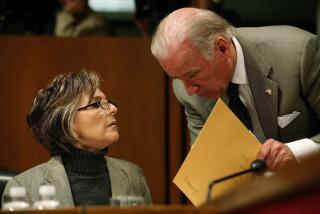In Battle for Florida, Lieberman Stands Firm on the Front Lines
- Share via
WASHINGTON — Even when Democrats were trailing Republicans by 55,000 votes in Florida on election night, when Al Gore was off writing a concession speech, Joe Lieberman was musing about a recount.
Now that the Democrats are a mere 538 votes from victory in Florida, the Democratic senator’s conviction that the presidency belongs to Vice President Gore has only hardened. And the public is glimpsing a Joseph I. Lieberman altogether different from the joyous, peppy campaigner it saw this fall.
Sweet, affable Joe now is tenacious, outraged Joe. Righteous Joe is resolute. The crinkly corners of his eyes that forever turned up during the campaign, even when he was excoriating George W. Bush’s record as Texas governor, seem relentlessly turned down.
Relentlessly smiling Joe is smiling no more.
Around Gore’s dining room table, the would-be president’s could-be vice president consistently has taken the position that, if every ballot in Florida is counted, the Democrats will win the state and the White House. He has reinforced the certainty Gore already feels, aides said, that this is no time to surrender.
‘Dead Set Against Giving Up’
The Connecticut senator, who has stood silently amid the furled flags behind Gore, has played a crucial role in giving the campaign the will to fight on.
When strategists such as Warren Christopher and Bill Daley voiced concerns that a prolonged effort might hurt the Democratic Party, Lieberman would hear nothing of it.
“There is the sweet Joe and the tough Joe, and he obviously feels very strongly that we should go forward,” said Tom Nides, who has served as Lieberman’s campaign manager since the August morning when he became Gore’s running mate.
But another advisor takes issue with a description of Lieberman as strident.
“Joe is still rational, civil and quite thoughtful,” said the aide, who asked not to be identified. “He’s just dead set against giving up.”
Several aides close to Lieberman said that his determination is rooted in how hard he worked to win Florida for the Democratic ticket.
After Labor Day, Lieberman campaigned there on nine separate occasions, spending 13 days traversing the state. And the observant Jewish senator did not limit his appeal to elderly Jews in South Florida.
He worked Latinos in Miami and moderates in the middle of the state. He spoke in black churches in Broward County and walked the pool sides of Palm Beach. He drew crowds of firefighters, sheriff’s deputies and students. Lieberman also paid his respects during a private stop at the grave of a powerful Cuban American leader; accompanying him was the late Jorge Mas Canosa’s son, an avowed Bush supporter.
Lieberman wooed relentlessly in the Sunshine State, and the day before the election he reassured an advisor: “I know we’re going to win there. I just know it.”
So, halfway through election night, Lieberman began pondering Florida’s recount provision. Later, after Gore left the room to write his concession speech, Lieberman turned to a staff member and said: “If I understand correctly, it’s an automatic recount if it’s within half of 1%, right?”
“It was at that point,” Nides said, “I realized what a fighter Joe Lieberman really is.”
Hours later, when Gore learned how close Florida was, it was Lieberman who first said that the ticket should not concede publicly, with Gore concurring, according to aides who were there.
And the day after the election, when it became known that a confusing ballot in Palm Beach County might have caused hundreds of elderly voters, many of them Jewish, to vote mistakenly for Pat Buchanan--the Reform Party candidate and a Holocaust minimizer--Lieberman was beside himself.
“He was in the living rooms of those voters in Palm Beach,” Nides said. “He has a certainty and passion about what happened in Florida. For good or bad, it was his signature.”
In the last 23 days a bunker mentality has built around Gore’s dining room in the vice president’s residence, and it has brought Gore and Lieberman closer than ever.
“Joe has been a complete and total partner with the vice president,” Nides said. “There has been no light between them.”
The wives also have bonded, with the couples going to the movies and dining together.
“If it turns out that Gore wins, the story of Lieberman’s vice presidency begins in this period of time because, in some fundamental way, they have come together in a room day after day after day,” the Lieberman advisor said.
Aides dismissed any suggestion that Lieberman let the ticket down by failing to deliver Florida, a place where he had a natural constituency.
“It’s about what he thinks is right,” the advisor said. “He really means it when he says, ‘How can we tell our children their vote counts if we don’t count every vote?’ ”
Rep. Rosa L. DeLauro (D-Conn.), an old friend from the politics of New Haven, noted Lieberman’s history of activism on voting rights. As a student at Yale in 1967, he traveled to Mississippi to support efforts to register black voters.
“When Joe believes in something,” she said, “there’s no one more tenacious.”
That spirit comes from his parents, Lieberman said in a telephone interview.
“I was raised to understand that most things that are good in life come after you have worked for them,” he said, “and that, if you believe you’re right, don’t be hesitant to fight. That kind of persistence and steadfastness were ingrained in me.”
Still, Lieberman’s role as a partisan warrior seems odd to those who have followed his career as a centrist in the U.S. Senate for the last 12 years.
Lieberman made his national reputation in 1998 when he criticized President Clinton for having an affair with a White House intern and then lying to the nation about it. He also has taken on such traditional Democratic supporters as trial lawyers and heads of Hollywood studios.
“Now, he’s a partisan’s partisan,” said a Democratic consultant who wonders if this role is the best thing for Lieberman’s reputation as a maverick and a bipartisan player.
Indeed, Lieberman has accepted repeated assignments to be Gore’s public, not-so-conciliatory voice. He has appeared on a dozen television talk shows, addressed the nation and hosted conference calls to Democratic House members to shore up their support and enlist their patience.
His Senate reputation as a Democrat willing to side with Republicans has not endeared him to some of his Democratic colleagues, who now are seething that he ran for--and won--reelection to his Senate seat rather than stepping aside in hopes that his seat would be kept by a Democrat if he became vice president.
Touching Base With All Sides
But he has stayed in close touch with Senate Minority Leader Tom Daschle of South Dakota and fellow Connecticut Sen. Christopher J. Dodd, as well as such Democratic moderates as Sens. Bob Graham of Florida and John B. Breaux of Louisiana.
Lieberman also has spoken regularly with the president he so famously criticized.
But it would be hasty to suggest that this partisan battle has made such a radical of Lieberman that he could no longer work with a Bush administration or sponsor bipartisan legislation.
When GOP vice presidential candidate Dick Cheney had a mild heart attack last week, Lieberman called him.
“He asked Cheney how he was feeling,” said Nides, “and suggested when this was all over, they should have a cup of coffee.
“Joe Lieberman is a guy who, if he thinks he’s being screwed, he’ll stand up and fight for it. But he’s not about to be bitter.’
*
Times staff writer Matea Gold in Los Angeles contributed to this story.
More to Read
Get the L.A. Times Politics newsletter
Deeply reported insights into legislation, politics and policy from Sacramento, Washington and beyond. In your inbox twice per week.
You may occasionally receive promotional content from the Los Angeles Times.










